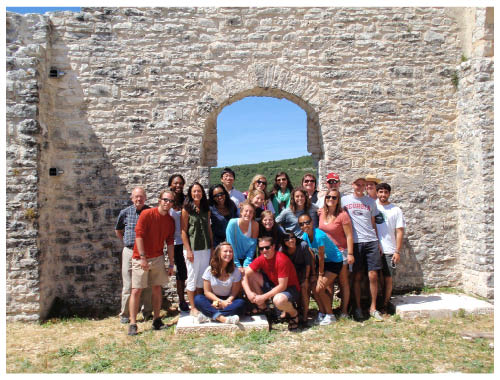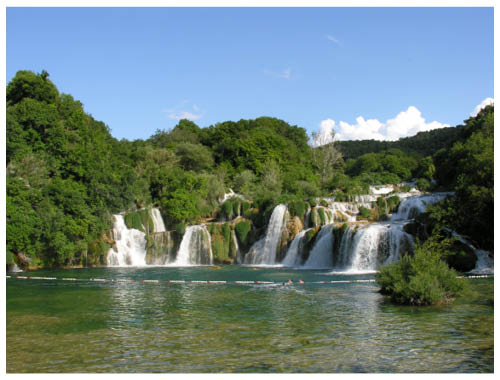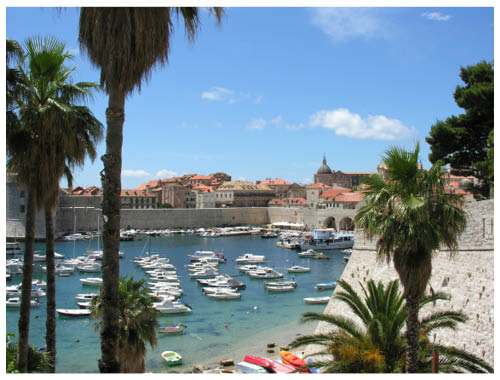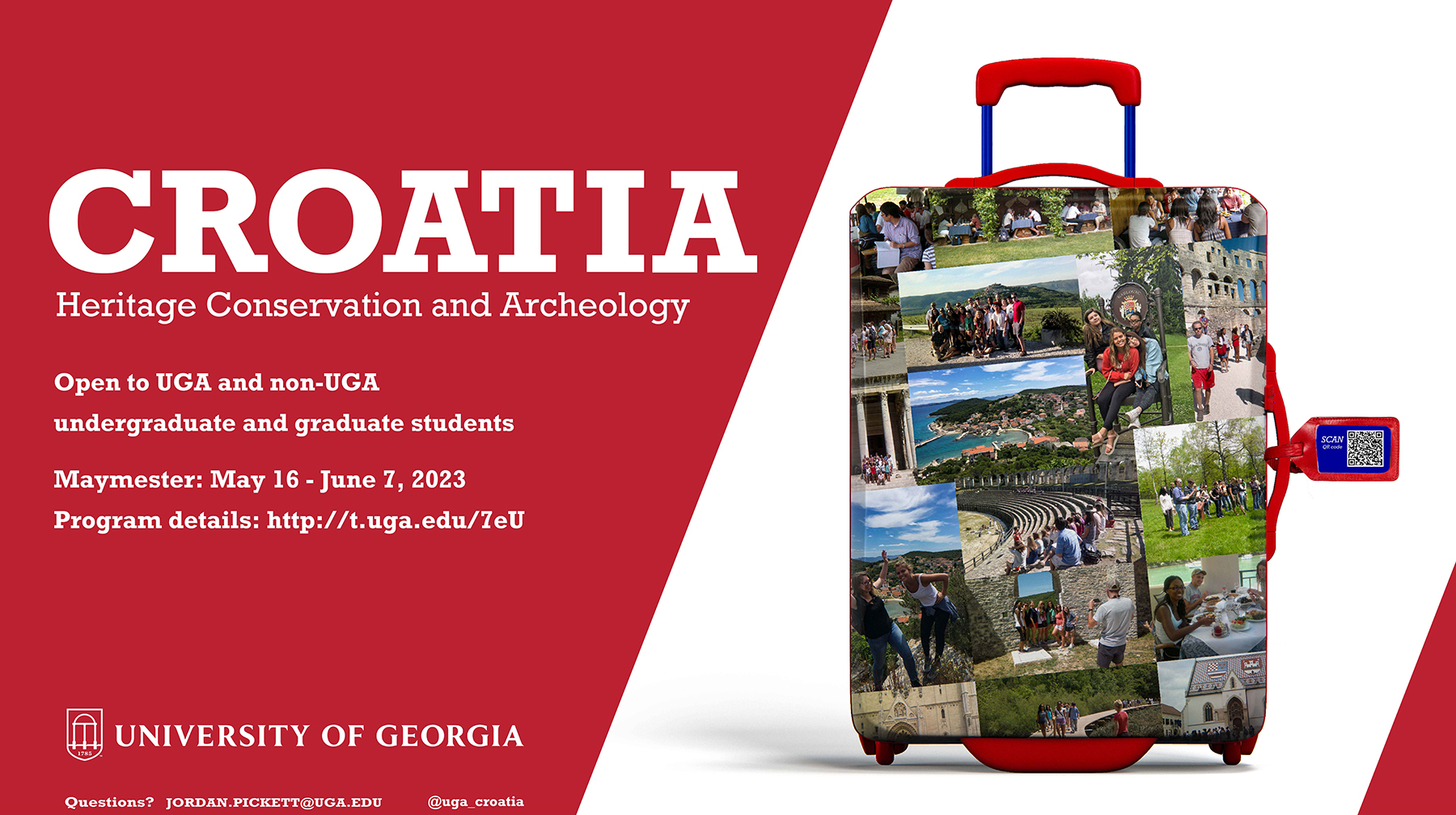2023 CROATIA MAYMESTER STUDY ABROAD
Croatia Maymester Information Session
Thursday, Nov. 17, 2022 @ 5:30 pm
Park Hall Room 265
and via zoom
https://uga-ced.zoom.us/j/98961940324
-- January Information Session date TBD --
Questions? Email jordan.pickett@uga.edu
Program dates: May 16 - June 7, 2023
HIPR 4070/6070
Regional Studies in Heritage Conservation
Professor Wayde Brown
wabrown@uga.edu
HIPR 4850/6850
Croatia NatureCulture: Relationship between Environment,
Heritage and Design
(Selected Topics in Heritage Conservation)
Professor Cari Goetcheus
cgoetch@uga.edu
CLAS 4305/6305
Archaeology of Roman, Late Antique, and Medieval Croatia
Professor Jordan Pickett
jordan.pickett@uga.edu
2023 Maymester in croatia
May 16 - june 7
Croatia: heritage conservation
and classical civilization

The Program
The cultural heritage of a nation, of a people, encompasses both past and present, the tangible and intangible. It is reflected in ancient monuments and contemporary art, in medieval street patterns and modern architecture, in traditional foods and the latest fashion in music. Cultural heritage is complicated, and so are nations. The Croatia Maymester Abroad is an exploration of the cultural heritage of Croatia, its storied past, its exciting present, and most importantly, its people.
The 2023 program will utilize an interdisciplinary approach to exploring heritage built around the intersection of art, classical civilization, and historic preservation. Courses will be taught by UGA faculty from the Franklin College Classics Department and the College of Environment and Design. There will be a focus on student fieldwork, and the active exploration of Croatian culture and heritage. Students will also enjoy considerable engagement with Croatian scholars and students from Croatian universities, and a wide range of Croatians actively involved in culture and the arts.

The Croatia Maymester Study Abroad Program is open to all undergraduate and graduate students with good academic standing.
To apply, visit the Office of International Education GoAbroad Portal:
UGA – CED Heritage Conservation and Classical Civilization
The Place
The program will explore three diverse regions of Croatia – the Zagreb region, the
nation’s heartland, capitol and largest city; Istria, a mountainous peninsula adjoining
Slovenia and Italy, and Dalmatia, a beautiful coastal region of islands and classical
culture. The class will visit southern Slovenia and the capital, Ljubljana, and spend
8 days in the Dalmatian city of Zadar, where the modern and the historic combine to
create one of Croatia’s most dynamic and exciting towns, named by the New York Times
as one of the 52 Places to Go in 2019. The Zadar region is a place to explore Roman
ruins and Venetian architecture, see contemporary art installations, and enjoy traditional
cuisine in a beautiful natural setting on the Dalmatian coast. Zadar, like other historic
Mediterranean cities facing increased development, makes an excellent laboratory for
studying the ways in which cultural heritage, especially art and built heritage, are
used to define a modern Croatian nation.
Today Croatia is a stable, peaceful, easygoing country that is a member of the European
Union. Less than 30 years ago, however, it was the scene of bitter conflict as the
nation sought independence from Yugoslavia. That hard-won victory has put renewed
emphasis on Croatian traditions that have kept alive a spirit of nationhood through
centuries of foreign domination.

program Itinerary
The working itinerary is subject to change, but it is planned to include Zagreb and central Croatia, southern Slovenia and its capital Ljubljana, the Istrian Peninsula including the cities of Buzet, Poreć, Rovinj and Pula, and the Dalmatian cities of Split and Zadar and the surrounding countryside.
ACADEMIC PROGRAM
HIPR 4070/6070 Regional Studies in Heritage Conservation (Pre-requisites will be waived)
HIPR 4850/6850 Croatia NatureCulture: Relationship between Environment, Heritage and Design (Selected Topics in Heritage Conservation) (Pre-requisites will be waived)
CLAS 4305/6305 The Archaeology of Roman, Late Antique, and Medieval Croatia [Selected Topics in Ancient Civilization]
The program offers three courses, from which students will choose two courses for a total of six hours of credit. HIPR 4070/6070 is primarily concerned with built heritage, HIPR 4850/6850 focuses on the relationship between natural environment and culture, and CLAS 4305/6305 concentrates on archaeology. All courses, however, share a common goal – a better understanding of Croatia through an exploration of its cultural heritage. Students will spend considerable time 'in the field', actively exploring, and analyzing, the built heritage of the cities of Zagreb, Zadar, Pula, Split, Ljublajana and other places we will visit. Through this active study, and through interaction with Croatians and Slovenians engaged in these fields, students will gain an understanding of Croatia and Slovenia and the way in which cultural heritage reflects – and perhaps influences – national identity.
In HIPR 4070/6070 students will first discover the richness of Croatia's and Slovenia's built heritage, and especially the many layers of architectural history, stretching from the Roman and Byzantine eras, through the medieval period, to the twentieth-century Communist regime. We will then examine how this built heritage has been managed, with specific reference to current issues in heritage conservation including the increasing pressures of tourism and the challenge of incorporating new architecture into historic places.
In HIPR 4850/6850, students will explore Croatian environmental systems and the ways in which humans have exploited and nurtured their relationship with such systems over time. Visible in the many places we’ll visit, students will learn how to ‘read’ the built environment, whether in a rural setting or urban center. Through the lenses of nature, culture, and design, we will discuss and reflect upon design and planning decisions, and how those have been managed to meet contemporary needs.
In CLAS 4305/6305 students will encounter the archaeology of Roman and Late Antique Croatia and Slovenia via engagement with sites such as the amphitheater and temple of Pula, Diocletian’s Palace at Split, and the ruined city of Salona. Students will learn to contextualize these monuments in terms of Roman and medieval architecture and urbanism, and to appreciate how their histories were produced in the context of nineteenth to twenty-first century archaeological practice, and packaged for modern tourism today. Assignments focus on developing skills in digital documentation of archaeological sites and structures.
ACCOMMODATIONS AND TRANSPORTATION
Housing will be double occupancy in hotels. Breakfast and some group meals will be provided, other meals will be on your own. Students are responsible for arranging their own transportation to and from Croatia. There are no direct flights from the US to Zagreb. A transfer will be required at a major European airport. The Program Director can provide a referral to a travel agent for assistance in booking on request. Travel within Croatia and Slovenia will be by chartered bus.
The Cost
The estimated program fee for the 2023 program is $3,600 ($3,300 fee and $300 deposit). The program fee includes room (double occupancy), breakfast, a number of group meals, local transportation while in Croatia; scheduled field trips and site admissions; and medical insurance. Additional expenses not included in the program fee are tuition and university fees (which may be partially covered by the HOPE or Zell Miller Scholarship), airfare, lunch and dinner where group meals are not provided, and spending money.
Financial Aid
The HOPE scholarship and other types of student financial aid that you may already be receiving can be applied towards tuition and fees. Although no program-specific scholarships are available, the program is partly supported by a generous endowment by Dr. and Mrs. Lawrence Phillips, which allows us to keep our program fee low. Students interested in scholarships should check with the Office of Global Engagement for other sources of funding.
ADMISSIONS PROCESS
Admissions are rolling and decisions will be made on the applications in the order received. After the February 29, 2023 decision date only applications marked "complete" by that time will receive a decision. Admission decisions will be sent via the studyaway.uga.edu application portal. Students will have a limited time to accept or decline an admission offer before the spot passes to another candidate. Students who accept the offer of admission must pay a non-refundable $300 deposit to confirm their place in the program and register for courses.
CONTACT INFORMATION
Dr. Jordan Pickett, Co-Director
Franklin College of Arts and Sciences, Department of Classics
Email: jordan.pickett@uga.edu
Dr. Wayde Brown, Co-Director
College of Environment and Design
Email: wabrown@uga.edu
Cari Goetcheus, Program Faculty
College of Environment and Design
Email: cgoetch@uga.edu


